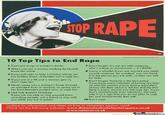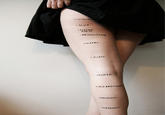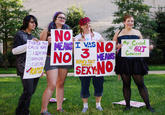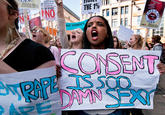Slut Shaming
Part of a series on Feminism. [View Related Entries]
[View Related Sub-entries]

About
"Slut shaming" refers to the practice of criticizing a woman for engaging in certain sexual behaviors outside of traditional gender roles, whether it be actual or presumed based on her manner of dress, speech or personality. Online, such practice has been discussed in the context of cyberbullying, as some cases have led to teenage girls committing suicide, and it remains a popular debate topic among social justice bloggers.
Origin
The hyphenated term “slut-shaming” began appearing in feminist blogging circles as early as on November 14th, 2006 in an article about a fight between two female bloggers written by Alon Levy at Abstract Nonsense.[6] After Skatje found out her former long-distance boyfriend was having cybersex with other women while they were dating, she posted a lengthy response about how terrible sex is without intimacy or love. When Katie rebutted that you do not need to love someone to have good sex with them, Skatje asked “And if I may be blunt, isn’t your lifestyle a perfect definition of the word ‘slut’?.” In response, Katie posted about the problematic nature of women calling other women sluts in a now-deleted blog post. Levy concluded the following:
The precise meaning of “Slut” is not relevant here. Slut-shaming isn’t about the use of the word, but about the implication that if a woman has sex that traditional society disapproves of, she should feel guilty and inferior.
Precursor
While stigmatizing women who appear to be sexually active or promiscuous isn't a new development by any means, online discussions about this practice have taken place since as early as 1999 on the Straight Dope message board[1] in a thread debating the double standard between male and female promiscuity presented within language. In the thread, some participants asserted that “slut” has an overall negative connotation, while words to describe men in this manner like “player,” “stud” or “pimp” all tend to carry a positive connotation. In August 2000, author Leora Tanenbaum published the book Slut! Growing Up Female with a Bad Reputation[2] which analyzed “slut-bashing” from the author’s autobiographical experiences in high school. Prior to the coinage of “slut shaming,” the term “slut-bashing” had been similarly used by sex ed magazine Sex, Etc.[3] in 2001 and in the academic paper “Form and Functions of ‘Slut Bashing’ in Male Identity Constructions in 15-Year-Olds”[4] by Michael Bamberg, which appeared in a 2004 issue of the journal Human Development. In 2006, the term appeared on Alas! A Blog[5] in reference to a male privilege checklist, asserting that there is no male parallel to "slut bashing."
Spread
In May 2008, a blogger named Sarah wrote a post on OhYouPrettyThings.net[7] about the practice within feminist blogging circles as a followup to a column article on feminists who are against sex work. Later that year in September, slut shaming became a hot topic on feminist blogs the Curvature[9] and Feminocracy[10] after singer Jordin Sparks derailed from presenting an award at the 2008 MTV Video Music Awards to rebut the host Russell Brand's previous jabs at the Jonas Brothers for wearing the chastity symbols.[8]
On April 4th, 2010, "slut-shaming" was defined for the first time on Finally, A Feminism 101 Blog[14], citing Levy's blog post. The definition looks at both the double standard in gender expectations of sexual behaviors, as well as why women are more often the perpetrators of this type of harassment. That October, "slut shaming" was defined on Urban Dictionary[15] for the first time, described in a negative light as a way for feminist to excuse their sexual behavior. As of January 2012, this definition has accrued more than 2500 downvotes. A more balanced definition was added to Urban Dictionary in November 2010.
Controversies
SlutWalk Rally
After Toronto Police officer Constable Michael Sanguinetti suggested that young women should avoid "dressing like sluts"[16] to deter sexual assault at a meeting on crime prevention at York University, a group of women led by Sonya Barnett and Heather Jarvis organized a march called SlutWalk.[17] Held on April 3rd, 2011[18], SlutWalk drew thousands of protestors, asserting that sexual assault is about an extertion of power and not about the victim's appearance.[19] The Toronto protest led to SlutWalks in other cities including London[20], Melbourne[21], Los Angeles[22] and New York City[23] throughout 2011, each drawings dozens of people supporting an end to victim blaming and slut shaming. Many photos and posts discussing the events have appeared on Tumblr with the tag #slutwalk.[24]



Teen Suicides
In 2009, slut shaming returned as a hot discussion topic after Ohio mother Cynthia Logan came out in public and revealed that her 18-year-old daughter Jesse committed suicide[11] after an ex-boyfriend shared nude photos of her with classmates who then harassed her by calling her a "slut." Months later in December, a 13-year-old girl named Hope Witsell[12] committed suicide after reportedly being shamed by her peers, which led to a lengthy discussion spanning over 150 comments about slut shaming on MetaFilter.[13] Similar concerns resurfaced in October 2012 when 15-year-old Amanda Todd took her own life after months of name-calling harassment. A month prior to her death, she uploaded a video (shown below) detailing how her peers had been bullying her.
Related Memes
Dear Girls, Don't Be Insecure
Dear Girls is a photoshopped image featuring model Cole Mohr in outer space holding a sign instructing women to not be insecure. Since its early appearance via Tumblr in August 2011, the photograph has been criticized for being pseudo-feministic and slut-shaming, while inspiring a number of parody re-enactments poking fun at the original message.

This Is What I Was Wearing (Tell Me I Asked For It)
“This Is What I Was Wearing (Tell Me I Asked For It)” is a slogan that was originally seen on a sign held by a feminist activist at the October 2011 SlutWalk in New York City. Online, both the slogan and the photograph of the protestor holding the sign have been parodied through image macros and photoshopped images on 4chan and Reddit.



When Did This Become Hotter Than This
“When Did This Become Hotter Than This?” is an image macro series comparing two sets of photographs featuring celebrities or famous subjects from two distinct time periods or generations. What began as a commentary on the ever-changing definition of beauty across generations, eventually led to online debates regarding the controversial issue of body images and even expanded across areas outside of celebrities, such as cute animals and inanimate objects.

Hey Girls, Did You Know
Hey Girls, Did You Know… is a multi-pane exploitable series that started in the summer of 2012 with an Instagram post by officialsabrina_xo criticizing the way women on the site often post cleavage-bearing shots of themselves (shown below, left). After it was posted to Tumblr on June 18th, other users on the site began parodying the image with statements asserting that women should be able to dress however they want without implications (shown below, right).


Search Interest
External References
[1] The Straight Dope – What are male "sluts" called?
[2] Amazon – Slut! Growing Up Female with a Bad Reputation
[3] Sex Etc. – Slut! Ho! Girls Speak Out on Slut-Bashing in School
[4] Clark U – Form and Functions of 'Slut Bashing' in Male Identity Constructions in 15-Year-Olds
[5] Alas! A Blog – Male Privilege Checklist: The Slut Phenomenon
[6] Abstract Nonsense – Slut Shaming
[7] OhYouPrettyThings.net – Slut.
[8] People – Jordin Sparks Defends Purity Rings on VMAs
[9] The Curvature – Purity Rings: Because Not Everyone Wants To Be a Slut
[10] Feminocracy – Jordin Sparks doesn’t want to be a slut like you
[11] Today – Her teen committed suicide over ‘sexting’
[12] The Curvature – 13-Year-Old Girl Commits Suicide After Classmates Spread Nude Photos
[13] MetaFilter – Sexting or slut-shaming?
[14] Finally, A Feminism 101 Blog – FAQ: What is “slut-shaming”?
[15] Urban Dictionary – Definitions for "slut shaming"
[16] Excalibur – Don’t dress like a slut: Toronto cop
[17] The Toronto Observer – Slutwalk set to strut past Queen’s Park to police HQ on April 3
[19] The Spec – ‘Slut walk’ crowded
[20] BBC News – Slutwalk London: 'Yes means yes and no means no'
[21] Sydney Morning Herald – A rally to find the slut in everyone
[22] IndyMedia – SlutWalk Los Angeles Storms West Hollywood California
[23] Huffington Post – Slutwalk NYC 2011 Takes Over Union Square To Protest Slut-Shaming, Victim-Blaming
[24] Tumblr – Posts tagged "slutwalk"
[25] Instagram – officialsabrina_xo
[26] Buzzfeed – Girl-On-Girl Crime: The "Did You Know" Slut-Shamers Of Tumblr
[27] Daily Mail – The teenage girls who are fighting back at their peers who 'dress too provocatively or wear too much make-up'
[28] New York Daily News – 'Slut-shaming' trend, sweeping Internet, adds meme form to adolescent cyber bullying
[29] WNYC – Sexual Cyberbullying: The Modern Day Letter A
[30] Facebook – Hey Girls, Did You Know
[31] Tumblr – Posts tagged "hey girls did you know"
[32] Good Morning America – Teen Shaming the Latest Online Rage Autoplay
[33] YouTube – CBS News- Hey girls did you know















